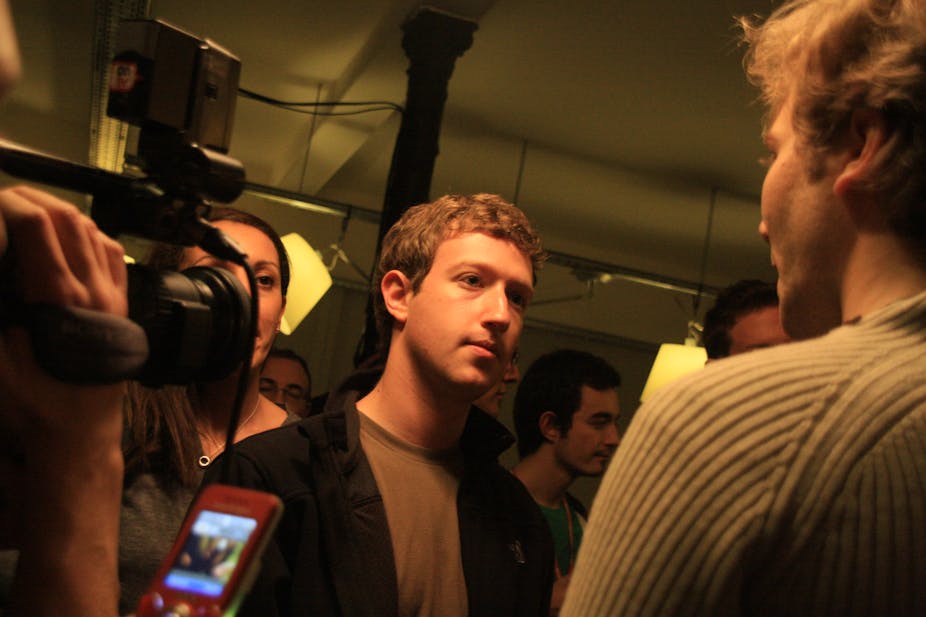With Facebook eyeing mobile internet, it is no accident that Mark Zuckerberg is making a much-publicised appearance at the Mobile World Congress in Barcelona this week.
In attendance are executives from mobile operators and these conference regulars are likely to greet the newcomer with some trepidation. They should consider themselves lucky though. Their business model monetises services directly, while Facebook’s struggles to do so indirectly through advertising.
Defending the home turf
In Europe, operators are trying to come to terms with the convergence of mobile, landline, and cable-TV industries and an increasingly pan-European market. Both make for intensified competition and a trend towards consolidation.
Operators essentially provide internet connections and have little control over what is provided through them. Some of the new mobile functions such as internet messaging through the likes of WhatsApp, and voice-over-IP telephony, known to you and I as Skype (and soon WhatsApp too) chip away at their traditional revenue sources and make it harder to recoup investments made in technology so as to provide faster connectivity for consumers.
In advanced markets, data packages are now increasingly the only thing consumers pay for. It is becoming harder and harder to justify other charges, be it for calls or texts, because consumers now have so many internet-based alternatives.
So it is understandable that operators are concerned about Facebook gaining so much clout that it feels it can challenge their last remaining source of income. Only a few weeks ago, Vodafone rebuffed a Facebook request to waive data charges for its app. Some are less steadfast: T-Mobile’s GoSmart brand in the US is already trying to attract customers with free Facebook usage. And several other operators have started down this slippery slope by providing access to a stripped-down version of Facebook, 0.facebook.com, without charging for it through their standard data fees.
Now Facebook has bought Instagram and, more recently, WhatsApp, it has amassed even more mobile users. One could imagine a situation in which Facebook (or Google, for that matter) is so powerful that it can force operators to waive data charges for its services or accept unpalatable consequences. If WhatsApp, Instagram, and the Facebook App were cheaper to use on some networks, consumers would switch to those. Charging for connectivity would become much harder for operators.
He who laughs last
Regulators might come to the rescue if Facebook were to use its market power in this way, but it might not come to that. Facebook is less of a threat to operators than it may seem. Its presence on mobile phones is more tenuous than on computer screens; the fact that it felt compelled to pay an incredible $19 billion to buy WhatsApp is testament to how much help it needs to get a foothold.
For Facebook to stomach such a price tag, it must expect a significant boost to its ability to make money in the mobile sector. Just being big in terms of user numbers doesn’t deliver profits, even if Facebook manages to push operators into keeping its data free of charge.
If WhatsApp rolled out its $1-per-year charge to all users, its revenues would still only be $500 million a year. At that rate, Facebook wouldn’t get its money back for decades. And even if WhatsApp continues to grow further and doubles its revenue per user through Skype-like telephony, clever network lock-ins, and value-added services, recouping the acquisition would still take what would feel like an eternity in the fast-moving and unpredictable tech world.
So the strategic motivation for paying an exorbitant price must be rooted in something else. Something that makes WhatsApp worth more as part of Facebook. Google integrating with Youtube drove traffic to the video site while allowing Google to place more advertising. Both were better off as a result. Facebook is likely to aim for a similar result with WhatsApp.
Akin to Google, Facebook’s interest is in mining consumer data and placing targeted advertising. Unfortunately, WhatsApp’s managers are fundamentally opposed to snooping and advertising on the messaging platform. Facebook duly promised it would do no such thing.
But advertising is crucial to Facebook’s business model and not being able to monetise WhatsApp’s user base negates the strategic rationale for the takeover. If Facebook really wasn’t interested in advertising, and instead wanted only to diversify its income streams, it needn’t have bought an expensive messaging app. A cement production company, say, or a waste removal firm would do.
Mobile users seem quite aware of this cognitive dissonance and are reacting already. Alternative messaging platform Threema saw usage numbers double over night when it was announced that WhatsApp users would soon be Facebook users. Telegram reported an even bigger surge. Google Hangouts, ICQ, Line, SnapChat, Viber, WeChat, Wickr, and others are also competing to absorb any customers migrating from WhatsApp.
Riding out the storm
Zuckerberg may have billions to splash but mobile executives should take heart. The desperation Facebook revealed through the purchase price reveals how tricky it is to build a business model on advertising alone. Few companies achieve it – the dotcom bubble and bust serve as a reminder of this.
Although providing connectivity is seldom associated with the sexiness of social media and mobile apps, the telecoms industry business model is at least built on robust foundations. It goes without saying that now is not the time to rest on their laurels as the market is entering a shake-out phase, but in the end there will always be a need for connectivity provision.
Operators that achieve European scale and manage to differentiate their offering through speed, reliability, and ubiquity will have a future. Less so the many companies struggling for attention and the advertising revenues that they hope will go with it.

